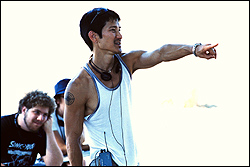The first response you’re likely to have after watching the latest Gregg Araki film is that it doesn’t seem like a Gregg Araki film. The Living End, Totally F***ed Up, Nowhere—those in-your-face efforts just don’t prepare you for the moving, measured stillness of Mysterious Skin (See review) . Taking time out from his recent appearance at SIFF, however, the surprisingly soft- spoken director says he sees his aesthetic aligned with that of author Scott Heim, on whose 1995 novel the film is based.
“A lot of the stillness you’re talking about, I think, is from this music,” says Araki. “[Heim’s story] has this very dreamy, beautiful gorgeousness to it, and it comes from this kind of British shoegazer music that came out in the late ’90s, particularly this band Slowdive that has been in every movie I’ve ever done, including the opening credits in this movie.”
Araki’s film tenderly captures the emotional fallout of childhood sexual abuse on two teenagers (the stellar Brady Corbet and Joseph Gordon-Levitt), but he insists that Heim’s book is responsible for the movie’s positive critical and audience response. “I really have to credit Scott because I think it’s in the story. The story itself treads such a delicate balance. It’s about something so troubling but also, in a way, so universal. It touches into everyone’s hurt and everyone’s pain.”
Surely, though, Araki had something to do with the remarkably nuanced performances, particularly the career-making turn by longtime child actor Gordon-Levitt (who, until now, would have had to list TV’s Third Rock From the Sun at the top of his bio)?
“The way Joe tells it is funny, because he presents me as this kind of cavalierly anti-method director,” Araki laughs. “I don’t really remember it, but he says, ‘One day I went to Gregg to talk to him, and Gregg turned to me and said [not to] think about it too much, just do it.’ Joe is so serious and he’s so prepared. He flew himself and [Heim] to Kansas because he wanted to visit where the story takes place—because we shot in Los Angeles. It’s such a sophisticated performance.”
So what will Araki take credit for? “So many movies today are just nothing—you walk out of them and you forget you saw them—and this movie has been so the opposite of that,” he allows. “Last night there was a woman at this screening who was so shaken she could barely speak. As a director, that’s really all I could ask for.”
Steve Wiecking








